The Proposal Read online
Page 6
“Very welcome. Now, tell me if my eyes deceive me, or have you become a guardian?”
“It’s all too true,” he said soberly. The other man was instantly alert.
“I take it you’ve done this unwillingly,” Palmer said, keeping his voice low.
“Not at all, but I made a mess of things when I hired a cruel nanny for Penny.”
“Oh, Jennings,” Lydia said, a hand to her mouth, her eyes large with shock and hurt over what she saw in his face. “Is the girl all right?”
“Yes, and I plan to keep her that way.” There was no missing the determination in his voice.
“Methinks,” Palmer said, a smile coming to his lips, “that before us stands a man with a mission.”
Jennings had no choice but to agree, a reluctant smile twisting his own mouth.
“How old are they?” Lydia wished to know.
“Thomas is twelve, James is ten, and Penelope, who goes by Penny, is six.”
“How did Godwin die?” Palmer asked next, glancing at the children. They had found a pile of small sticks and were throwing them into the water. Palmer didn’t notice his brother-in-law’s lack of response until he looked back at the man.
Standing very still, his eyes on Palmer but not actually seeing him, Jennings looked stunned. He stared down at his sister as well, his mind racing.
“What is it, Jennings?” Lydia pressed.
“I never asked them,” the prodigal brother admitted, his face turning away from them in pain and astonishment over his own lack. “They landed at my door so suddenly. The letter warning me of their coming was lost. I had no word. We just began life together. I can’t explain beyond that.”
Lydia felt a rescue was needed. She spoke kindly and sincerely when her brother finally looked back at her.
“We’re so pleased that you came to gain help with this little girl, Jennings, but could it be that the boys might benefit from this visit as well?”
Again, William Jennings had no choice but to agree.
The children had tired of the game and were headed their way. Jennings was grateful he’d realized these things in the presence of his sister. Lost as he felt just now, he watched the warm, gentle way in which she welcomed Thomas, James, and Penny to Tipton and somehow knew that everything would be all right.
Chapter Five
“Thomas, James, Penny,” Lydia said as soon as she had taken the children indoors, “I’m so sorry for your loss.”
“Thank you,” Thomas replied, feeling very real comfort from the warmth in her soft, feminine voice, and the tender way she touched Penny’s small head.
“Our children are on an outing just now, but they’ll be returning soon. Would you like to see your rooms?”
Penny had moved in rather closely to Thomas on this question, and Jennings took note of it.
“Is there a room that would accommodate all three children, Liddy?”
“There is,” she told him before looking back to the children. “You boys don’t mind sharing a bed?”
“No, ma’am,” James answered, his little face serious. “We need Penny near us.”
“I’m so glad you told me, James, and you must go on telling me anything you need. Come this way now, and we’ll see you all settled.”
Through a spacious entryway and to the foot of a wide staircase, the children followed their hostess. The house was spacious but still felt homey. The sweeping stairway led to a wide hall and rooms that at a swift glance appeared to be roomy as well.
The children took it all in, seeing things familiar to them and others that were new and thus intriguing. Their room held two beds and all the normal amenities, but the views from the windows were new, as was a large painting of a ship and a detailed map of the area.
“How will this be?” Lydia asked, her face wreathed in smiles and her heart feeling pleased that the children could meet them a little at a time. Her own children were well mannered, but at home they were a boisterous group, and Lydia did not want these new members of the family overwhelmed.
“Did you need me, mum?” A female voice brought all eyes to the door.
“Yes, Judith. I want the children to come back downstairs with me. Would you be so kind as to settle their things?”
“Of course, mum,” the servant said with a smile. “And who are these fine children?”
Lydia’s smile matched hers.
“These are my young cousins. Here is Thomas, then James, and the young lady is Penny. Children, this is Judith, and she takes very good care of us. Should you need anything, Judith can help you.”
“Indeed, I can, and I’m going to start by making this room your very own. When you return, all your things will be tucked away, and you’ll have the fun of finding them.”
They smiled at her, drawn to her bubbly welcome. Lydia, however, didn’t linger. She shepherded the children down to the large drawing room, where Jennings and Palmer were talking.
“Ah, here you are,” Palmer welcomed. “Did you like your room?”
“Yes, thank you, sir,” Thomas said with feeling. “We will be most comfortable.”
“Good, good. Did Mrs Palmer tell you that our children will be home soon?”
“She did, yes.”
“And did she also tell you that you are alike in age? Our Frank is twelve, Walt is ten, Emma is seven, and Lizzy is soon to be five.”
“And before I forget,” Lydia put in, noting that Jennings was sitting very quietly during this exchange and taking it all in, “I must get your birthdays, children. Why don’t you give them to me right now?” she asked as she moved to find paper at the small writing desk.
“You’ve done something to make them laugh,” Palmer said, and Lydia turned to find the children smiling hugely.
“What did I say?” she turned to them, glancing at Jennings and wishing he wasn’t quite so inscrutable.
“We share a birthday, Mrs Palmer, and it’s always a bit funny when others discover that.”
Lydia came to a complete halt.
“The three of you? You all have the same birthday?”
“Yes, ma’am.”
“When is it?”
“Twenty-one July,” James informed her.
“Why, James, that’s only about a month away.”
“Yes, ma’am,” Thomas answered, taking charge again. “I will be thirteen, James will be eleven, and Penny seven.”
“And all on twenty-one July?”
The children nodded, the boys still smiling greatly at her reaction. Penny had grown distracted with the pattern on the carpet. Lydia turned to the other adults in the room, but only Palmer was having a good time with this. Jennings looked more strained than ever.
“Well, just let me write that down, and then you children can go and play for a time. How does that sound?”
It had been Lydia’s plan to speak with the children for a time—she knew that Palmer wanted that too—but she couldn’t ignore her brother’s demeanor. And Lydia wasn’t the only one to notice. The children had no more left, having been given instructions on finding the nursery, when Palmer spoke to his wife’s brother.
“What’s troubling you, Jennings?”
Jennings came abruptly to his feet. He strode to the window, back straight with dread, and stood looking out. The Palmers waited. At last he turned to them, his features set.
“I’m not sure we can stay.”
“Why, Jennings?” Palmer asked, even as he sensed his wife tensing.
Jennings shook his head, unable to find the words. After several more seconds, he spoke.
“It has occurred to me that I’ve grown myopic in recent years.”
“In what way?” Palmer questioned him.
“I’m centered on my own interests and no one else’s,” Jennings answered as he began to move about, this time in agitation. “I didn’t even remember until I’d walked into this room and saw the Bible on the table why I’d broken contact with you in the first place, and now the children’s birthdays!
” he fumed quietly, his sentences running together. “I didn’t even think to ask them such a thing. I wanted those boys the moment I saw them. I was relieved to have them without having to deal with a wife, but I never intended for Penny to be harmed, and I won’t stand for it! But not until just now did I realize that by coming to you for help, I’ll be opening myself up to hearing all sorts of nonsense about God, things I don’t wish to hear. At the same time, I know I can’t do this alone. I’ve got to have help with these children, so it would seem I have no choice.”
Jennings had kept his voice quiet during the entire tirade, but it had gone from passionate to thoughtful. He did not expect to turn and find his sister’s hand over her mouth, her eyes filled with merriment.
“Lydia, do not tell me you are amused by this!”
“But, Jennings,” she said as a soft laugh escaped, unable to help herself, “You are too funny. You insult us and then tell us you need us. On top of that, I don’t know when I’ve heard such passion from you on any subject.”
Though still not able to laugh at himself, Jennings relaxed some and even sat down again. He looked to his brother-in-law and found him slightly amused as well.
“Remind me, Jennings,” Palmer asked calmly, “what did we do those many years ago that caused you to run?”
Looking at them now, still the kind, warm people he remembered from many years back, Jennings drew a blank. They sat a moment, silence surrounding the three of them, before full memory returned to Jennings.
“Are you still attending that church where Pastor Hurst tells people about their sin?”
“Yes, we are,” Palmer said without apology.
“And how many followers does he have now?”
“Pastor Hurst? He hasn’t any. We’re following Jesus Christ.”
It was the very thing he expected them to say, the very thing that had made him so dreadfully uncomfortable before, but this time there was a difference. They had already welcomed him and the children, and he didn’t believe they’d done this with a hidden agenda.
“I guess the first thing I should ask,” Jennings started again, “is whether we’re still welcome now that I’ve insulted you?”
“For as long as you like,” Palmer said, his voice and manner still mild. “But I must warn you, as soon as the cousins meet, no matter how uncomfortable you feel, you’ll not escape easily at all.”
“I hadn’t thought of that,” Jennings admitted, remembering how shocked he was to hear that his sister had four children.
After thinking for a moment, Jennings made up his mind. He might disagree wholeheartedly with his sister and Pastor Hurst, but he would not separate from his family again. He wanted to know his only nieces and nephews, and he wanted his young charges to know them. But even beyond that, one fact was glaringly evident: He hadn’t the slightest idea how to be a parent, and for the sake of the three children now entrusted to him, he would stay.
“What do you think of them?” Thomas asked of James when they’d found the nursery and settled in. The room’s furnishings were a bit on the young side for Thomas, but he was happy to do nothing for a time and to do it in a place that felt safe.
“They’re nice. Does Mrs Palmer remind you of Aunt Fanny?”
“She wasn’t really our aunt, James—just a neighbor.”
“I know, but her voice is like Aunt Fanny’s, and she was very kind.”
“Yes, she was,” Thomas agreed softly, and if James had been looking at him just then, he might have asked about the speculative look on his older brother’s face. Had Thomas shared, he would have asked how Mrs Palmer could be so kind when her brother seemed so aloof. He knew some of it was the difference between men and women, but his heart sensed that there was more to it.
“I can’t get it out.” Penny’s voice floated into Thomas’ musings, and he watched as James dislodged a block from inside the large dollhouse.
“Thomas,” Penny asked when she had the block in hand, “what did Mrs Palmer say her daughters were named?”
“I think it was Emily and Lizzy.”
“No, it was Emma and Lizzy,” James corrected as he dumped a puzzle on the floor.
“That’s right. And they’re your age, Penny.”
Penny nodded but didn’t comment. She went back to the dollhouse, her face pensive. Thomas could have asked her if she was upset, but he thought he knew. It was nice to feel safe, and it would be fun to gain new playmates their own age, but not all the toys and friends in the world would take away the ache they felt to see their father one more time.
The Palmer children were on an outing with their neighbor, Miss Marianne Walker. She was too young to be their mother but old enough to be responsible for them. A young aunt was how she’d described herself one time, but the children still thought of her as an older sister.
Young Frank Palmer, oldest of the Palmer children, not overly distracted by the flowers his sisters were picking, was enjoying his time by the stream. The small fish were active at this time of year. He found them fascinating and wondered at the fact that they never seemed to bump into each other. The occasional rub alongside could be seen, but rarely was there a head-on encounter, even in the midst of panic. That, along with the splendid rocks he was finding, made him feel he could sit in this spot all day.
“What did you find, Frank?” Walter Palmer, Walt to family and friends alike, asked as he approached.
“An interesting rock. Look at the shape.”
“It looks like a fish.”
“I think so too.”
“You should see the fish a little way down the stream, Frank. Come and see them.”
“Look right here, Walt,” Frank invited. “They’re very active here too.”
“Oh, yes, but there’s more down where I was.”
That was all Frank needed to hear. He accompanied his brother down the shore and sure enough, they stumbled on roughly twice the fish as had been in Frank’s area.
Across the small wooden bridge, knee-deep in wildflowers, stood their escort. Beside Marianne were Emma and Lizzy Palmer.
“Look at this one, Marianne,” Lizzy directed, showing her a small yellow bloom.
“Isn’t it pretty?” Marianne agreed as she shifted the basket to include it.
“Where did the pink one go?” the youngest girl now asked.
“With all the other pink ones,” Emma explained, her brow raised in surprise that this had not been more obvious to her sibling.
“But I wanted that one,” Lizzy said, her face sincere.
“Here.” Marianne crouched down to her level and let her look into the basket. “See if you can find it.”
“Oh, Lizzy,” Emma said with a laugh like her mother’s, “you’ll never spot it.”
“I will, Emma. I know just the one.”
Marianne remained quiet as Lizzy examined the flowers. Lizzy’s small brow was earnestly wrinkled as she searched, and Marianne couldn’t stop her smile. The almost-five-year-old was such a perfect combination of her parents, with her father’s dark curls and her mother’s blue eyes.
“This is it,” Lizzy said, her face lighting up.
Marianne hugged her.
“I’m so pleased you found it.”
“It’s pretty.”
“Yes, it is—just like the little girl holding it.”
Lizzy smiled at her and moved in for another hug.
“Marianne,” Walt called to her when she came to her feet; he was still near the stream. “Are we moving on now?”
“Are you ready?”
A yes came from both boys, and the girls began to gather their things. The five of them walked back to the waiting carriage and driver, towing along their rocks and flowers.
“Are your hands muddy, Liz?” Frank asked of his sister before he would allow her to climb into the carriage.
“Just a little,” she said as she displayed them.
Marianne came from behind them and offered her handkerchief. “Here, use this, Lizzy.”
>
“Thank you,” the little girl said, remembering her manners. But it did little good. The handkerchief ended up as dirty as the small hands, which didn’t look as though they’d been cleaned at all.
“It’s all right, Lizzy. You can wash before we have lunch. Mildred is always ready for you,” Marianne said, referring to the head housekeeper at her parents’ home.
“Are we having lunch at your house, Marianne?”
“Yes, Walt. I wanted to show you my new book.”
“The one on pyramids?”
“Yes. It arrived yesterday.”
With that they were off. No one ever declined a meal at Blackburn Manor—it was much too fun for that. Blackburn Manor was Tipton’s nearest neighbor. Set in a fair glen at the base of the foothills, it was picturesque and inviting.
When the coach stopped in the wide courtyard, a footman held the door while the five explorers emerged from the carriage.
“Here you are!” Mildred exclaimed with delight as she met them just inside the front door. To Marianne she said, “Your mother is on her way.”
“I’m here,” Mrs Walker proclaimed as she entered the spacious foyer not many steps behind Mildred, a smile in her voice and on her face. “How was the outing?”
“Splendid, but we’re all quite famished,” Marianne responded with familial ease as she kissed her mother’s cheek.
“How are you, children?” Mrs Walker greeted. She listened to their tales of the morning’s adventure before Mildred whisked them away for a swift wash before convening for an early lunch.
Around the table just ten minutes later, Mr Walker also in attendance, the children continued to tell of their exploits.
“What color flowers did you girls find?” Mr Walker asked of Lizzy and Emma.
“Some yellow, some pink, and some muddy.”
The table enjoyed this description from the youngest member of the group.
This covered, Frank wished to know if Mr Walker knew anything of fish and their swimming habits. Mr Walker, Frank, and Walt then had a long discussion on the subject.
Not until the meal began to wind down did Marianne say they would be having pudding on the lawn. Thrilled with this news, the children happily moved outdoors from the comfort of the dining room and the delicious meal that had been prepared. Remembering to express their thanks, they trailed after Marianne as though she were blowing a flute.

 A Texas Sky
A Texas Sky The Rescue
The Rescue To Know Her by Name
To Know Her by Name Wings of the Morning
Wings of the Morning White Chocolate Moments
White Chocolate Moments Sean Donovan
Sean Donovan The Proposal
The Proposal Beyond the Picket Fence
Beyond the Picket Fence Every Little Thing About You
Every Little Thing About You City Girl
City Girl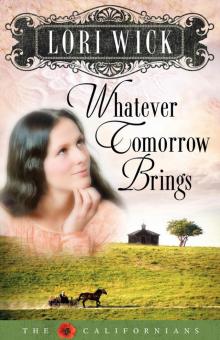 Whatever Tomorrow Brings
Whatever Tomorrow Brings A Gathering of Memories
A Gathering of Memories Just Above a Whisper
Just Above a Whisper Jessie
Jessie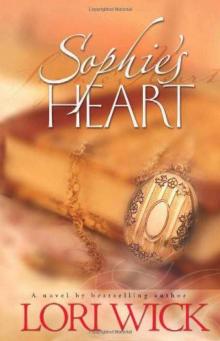 Sophie's Heart
Sophie's Heart Lori Wick Short Stories, Vol. 1: Be Careful With My Heart, the Haircut
Lori Wick Short Stories, Vol. 1: Be Careful With My Heart, the Haircut Cassidy
Cassidy The Long Road Home
The Long Road Home The Visitor
The Visitor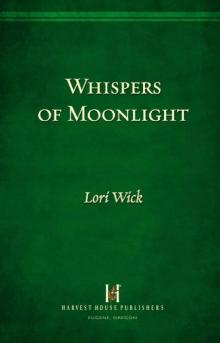 Whispers of Moonlight
Whispers of Moonlight Who Brings Forth the Wind
Who Brings Forth the Wind Lori Wick Short Stories, Vol. 4: The Rancher's Lady
Lori Wick Short Stories, Vol. 4: The Rancher's Lady The Hawk and the Jewel
The Hawk and the Jewel Lori Wick Short Stories, Vol. 3: An Intense Man, the Camping Trip
Lori Wick Short Stories, Vol. 3: An Intense Man, the Camping Trip Leave a Candle Burning
Leave a Candle Burning Promise Me Tomorrow
Promise Me Tomorrow Bamboo & Lace
Bamboo & Lace Every Storm
Every Storm The Knight and the Dove
The Knight and the Dove The Princess
The Princess Lori Wick Short Stories, Vol. 2: Beyond the Picket Fence
Lori Wick Short Stories, Vol. 2: Beyond the Picket Fence A Song for Silas
A Song for Silas Pretense
Pretense Lori Wick Short Stories, Christmas Special
Lori Wick Short Stories, Christmas Special Where the Wild Rose Blooms
Where the Wild Rose Blooms The Princess Special Edition
The Princess Special Edition As Time Goes By
As Time Goes By Lori Wick Short Stories, Vol. 2
Lori Wick Short Stories, Vol. 2 Every Little Thing About You (Yellow Rose Trilogy 1)
Every Little Thing About You (Yellow Rose Trilogy 1)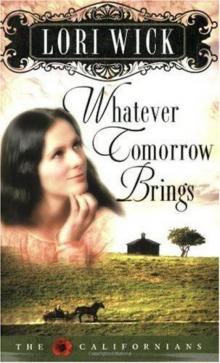 Whatever Tomorrow Brings (The Californians 1)
Whatever Tomorrow Brings (The Californians 1) The Hawk and the Jewel (Kensington Chronicles 1)
The Hawk and the Jewel (Kensington Chronicles 1) A Texas Sky (Yellow Rose Trilogy)
A Texas Sky (Yellow Rose Trilogy) Who Brings Forth the Wind (Kensington Chronicles)
Who Brings Forth the Wind (Kensington Chronicles) Cassidy (Big Sky Dreams 1)
Cassidy (Big Sky Dreams 1) Lori Wick Short Stories, Vol. 3
Lori Wick Short Stories, Vol. 3 Jessie (Big Sky Dreams 3)
Jessie (Big Sky Dreams 3) Sabrina (Big Sky Dreams 2)
Sabrina (Big Sky Dreams 2) Lori Wick Short Stories, Vol. 1
Lori Wick Short Stories, Vol. 1 Sabrina (Big Sky Dreams)
Sabrina (Big Sky Dreams) A Place Called Home (A Place Called Home)
A Place Called Home (A Place Called Home) City Girl (Yellow Rose Trilogy 3)
City Girl (Yellow Rose Trilogy 3)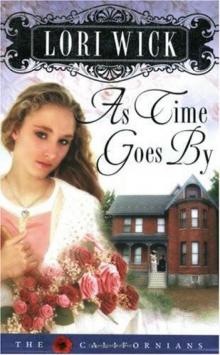 As Time Goes By (The Californians 2)
As Time Goes By (The Californians 2) A Place Called Home (A Place Called Home 1)
A Place Called Home (A Place Called Home 1) Lori Wick Short Stories, Vol. 4
Lori Wick Short Stories, Vol. 4 Wings of the Morning (Kensington Chronicles)
Wings of the Morning (Kensington Chronicles) Beyond the Picket Fence: And Other Short Stories
Beyond the Picket Fence: And Other Short Stories